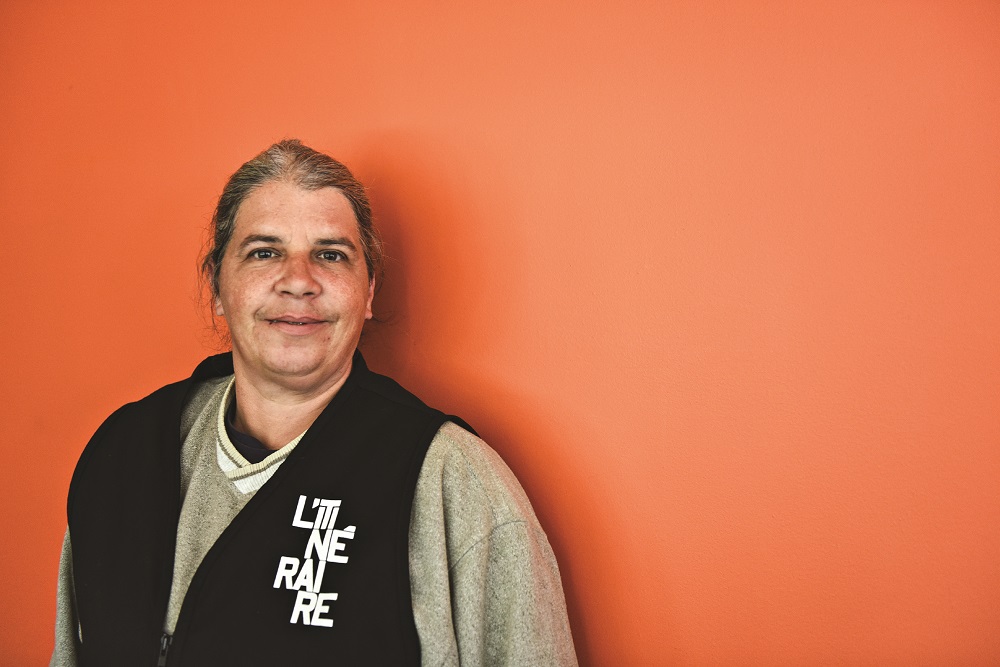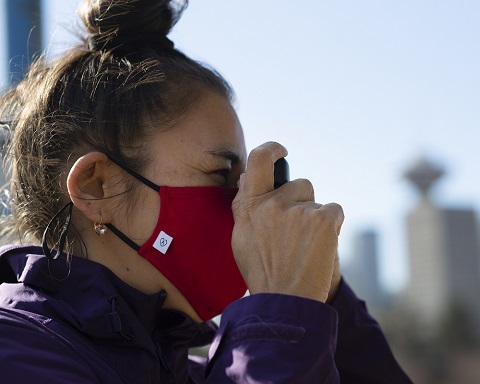Interview by Camille Teste, L’Itinéraire
What pushed you to undergo gender reassignment? Was there one event in particular that motivated you to go ahead with the process?
The question that comes around most often is: “Why now, aged 45?” To be honest, no one fell out of their chair when I announced that I was planning to start the gender reassignment process. They were mostly surprised that I had waited so long.
In actual fact, I went to a therapist last spring with worsening depression. That was the kind of push [that I needed]. While I was there, I realised that I had gotten rid of the ‘other reasons’ behind my struggles and that this was really the only issue left.
What is the right term to use when speaking of the process?
Personally, I used the term ‘transformation’ for the first few months. On several occasions, people within the trans community have suggested that I use the term ‘transition’. I should point out that I’m not speaking on behalf of the trans community here, but about myself. I think that when we speak of ‘transformation’, we focus on the physical aspect. In contrast, when we speak of ‘transition’, we incorporate all the steps and spheres of the gender reassignment process.
For me, it’s almost as though I’m going to go through a second adolescence over the next few years – a process that is going to allow me to set things straight. This is because adolescence is effectively a period of ‘transition’; a time when the idea of ‘transformation’ is materialised in the emergence of our secondary sexual characteristics. That’s how I see my situation: it’s a period of ‘transitions’ that will involve several moments of ‘transformation’. But, just like the experience of being a teenager, it doesn’t boil down to the physical changes. It’s more complex than that. I’m going to be securing my identity, redefining my social roles, and so on.
For now, I notice that I speak of ‘transformation’ whenever I focus on the changes that my body is about to go through and ‘transition’ when I’m speaking more generally.

Are you going to change your name?
Yes, and since it was my sister who chose my female name when I was born, I asked her to choose my male name. She came up with Yannick.
Should we start calling you Yannick right away?
You can’t ask the impossible! There are people who have known me for 10, 30 or 45 years in a certain body with a female name. I don’t expect everybody to adapt right away. My environment also has to ‘transition’. Of course, that’s just my opinion – I know some trans people are less flexible about the issue.
In any case, I think it’s going to be easier when I have a beard and no longer have breasts. Up to this point, those around me have made a lot of effort and have been really respectful. Some have started to call me ‘Annick’. I’ll give them a gold star for effort!
Will you still consider yourself homosexual?
It’s difficult to answer that question. Not because of the changes that are about to happen, but because I’m not sure from which point we should define ourselves. The gender assigned to us at birth or the one we are in our heads?
It would be more straightforward to say that I think I will still be attracted to women.
I see my situation as a period of ‘transitions’ that will involve several moments of ‘transformation’
Do you have to have had surgery to be considered transgender?
The word ‘trans’ is an umbrella term that includes anyone whose gender does not correspond to the one assigned to them at birth. A person can be transgender before surgery.
With regards to your legally stated gender, the law was recently changed [in Canada] so that you are no longer required to have undergone surgery to change your gender. To do so in an official capacity the applicant still needs to provide a sworn statement countersigned by someone who has known them for at least a year. It’s a way to attest to the seriousness of the process.
Not so long ago, it was the surgeon who was responsible for the gender reassignment. They signed the form to change the patient’s civil status. It’s good to see that things are changing.
Is gender assignment expensive? Is it the same price for trans women and trans men?
Here in Quebec it’s more expensive for trans women [who are transitioning from male to female] than for trans men [who are transitioning from female to male].
With regard to the surgery, both procedures involving the genitals are covered by insurance. However, the torso masculinisation procedure for trans men is covered, while breast implant surgery for trans women is not.
Several factors account for the differences in cost. When it comes to secondary sexual characteristics, it should be pointed out that it is easier to grow hair than to get rid of it! Certain costs can also be explained by the women’s beauty industry. For example, a lot of women undergo breast surgery, so it is considered more of an aesthetic surgery than a purely medical procedure. This means it’s rarely covered.
Will you be able to have sexual relationships after your surgery?
For now, I don’t know. In all honest, post-surgery sex isn’t my biggest concern right now. In theory, if everything goes well and I reach the end of the process, I should have a penis, be able to pee standing up and be able to have sexual relations that involve penetration, erogenous zones and orgasms.
To get to that point, you need to undergo three procedures and that depends on several factors, both financial and health-related. For example, there is hormone therapy. I also need to have permanent hair removal on the area of my body that’s going to be used for constructing my penis. While the surgery is covered by insurance, the laser therapy or electrolysis required for the procedure is not.
Another example: I also need a letter from a sex therapist or psychologist who has had trans training. That is also going to cost me money. I’m also going to have to stop smoking – that’s compulsory.
In your opinion, is it more mentally challenging to transition from a woman to a man, or a man to a woman?
It’s hard to make generalisations in the trans world, especially when talking about mental suffering. I feel as though in social terms, it’s easier to transition from a woman to a man. Men who become women are more harshly judged. Some cisgender men see it as some kind of betrayal.
On the other hand, there will always be some alpha males who feel threatened by women who become men. But for the most part, it is easier.
I’m looking forward to finding a sense of consistency between my heart, my mind and my body
Do you plan on telling your customers?
It’d seem a bit odd to say ‘no’ after this interview is released! There were already a lot of questions when I was away from my sales spot this spring having therapy sessions. That’s why I decided to start talking about it with my regular customers. I prefer to prepare people for the change.
Do you find the process easy to talk about?
I am able to talk about it fairly easily, yes. I’ve worked a lot on acceptance, tolerance and my decision in therapy. It’s helped me. I like questions: they help me to reflect and give me material for the blog I’ve created too – even if I don’t have all the answers.
Why did you first start your blog [yan1541.blogspot.com]?
I know it is a little strange for me to refuse interviews and photos, and then to project myself into this public space while talking about such a sensitive subject. At first, I created the blog to avoid having to repeat myself all the time and to keep my network informed.
But now I actually think that I should make the blog more accessible and use it more, because it could be useful. There is actually not a lot of information in French on the subject and, when it is in French, it’s often European content. What’s more, there are even fewer informative sources about female to male transitioning.
Are you looking forward to living in this society as a man?
That’s the big question! I’m looking forward to living as a man; to finding a sense of consistency between my heart, my mind and my body. I’m looking forward to securing my masculine identity.
But to do all that while “living in this society” is a different question altogether. I am going to have to define my place as a man in a society where even cisgender men are having to do the same.
Translated by Chloe Anderson
Read more coverage of #VendorWeek 2019 here.




















